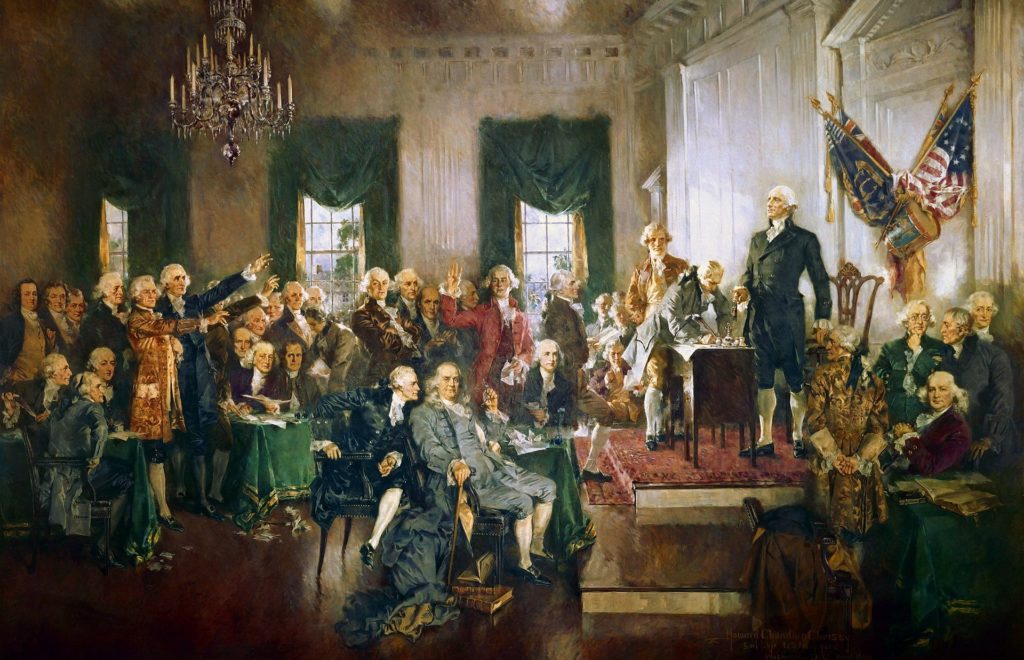January 2021 Online High School Seminars
The Witherspoon Institute is pleased to offer new online seminars for high school students. During this unprecedented time, many young people are finding their education disrupted. We are offering opportunities for students to enhance their education this year by exploring deep questions on love, the political order, death, and more with the help of great thinkers.
Till We Have Faces Seminar
Although it may be surprising to admirers of the Chronicles of Narnia, the space trilogy, and apologetic works like Mere Christianity, C. S. Lewis affirmed that his unusual and mysterious novel Till We Have Faces is “far and away my best book”. His friend and fellow author J. R. R. Tolkien agreed. Based upon the story of Cupid and Psyche, this beautiful and often troubling novel masterfully explores the psychological and spiritual inner life of the ruler of a “barbarian” country on the edge of the civilized Greek world in the last days of paganism, before the advent of Christianity. Vivid and gripping, this challenging novel demands much from its readers as it invites them to examine their own loves. This three part seminar will guide advanced high school students in understanding the theological, philosophical, and literary richness of Lewis’ last fictional work, and will pair the novel with selections from Greek and Roman mythology and Lewis’ The Four Loves.
Click the button below to submit a brief application. Applications are due at 11:59pm Eastern Standard Time on December 31st, 2020. A registration fee of $25 will be required of accepted students to reserve their place in the seminar.
When you reach the Submittable page by clicking the button below, be sure to choose January 2021 Online High School Seminar Application.

Led by
Maura Shea, The Witherspoon Institute
7:00pm – 8:20pm
Tuesdays: January 12th, 19th, 26th, 2021
Format: Online, Zoom
Open to current juniors and seniors in high school
Chesterton’s Orthodoxy: The Adventure of Belief Seminar
G.K. Chesterton’s works helped bring C.S. Lewis to Christianity and influenced Gandhi, and yet his thought-provoking and highly-enjoyable works are rarely read today. In order to do something about this sad state of affairs, in this four-part seminar we will read Chesterton’s Orthodoxy, the book in which he explains the Christian faith and its relevance to the modern world. By working through this text together, we will come to understand why Chesterton thinks Christianity is the faith that fills man’s “double spiritual need, the need for that mixture of the familiar and the unfamiliar which Christendom has rightly named romance.”
Click the button below to submit a brief application. Applications are due at 11:59pm Eastern Standard Time on December 31st, 2020. A registration fee of $25 will be required of accepted students to reserve their place in the seminar.
When you reach the Submittable page by clicking the button below, be sure to choose January 2021 Online High School Seminar Application.

Led by
Felix Miller, Catholic University of America, The Witherspoon Institute
Andre Mendoza, Princeton University ’20
7:00 PM – 8:20 PM
Wednesdays: January 6th, 13th, 20th, and 27th, 2021
Format: Online, Zoom
Open to current juniors and seniors in high school
“A More Perfect Union”: The Federalist and the Debate Over an American Constitution
Are “societies…really capable or not, of establishing good government from reflection and choice,” or are they “forever destined to depend, for their political constitutions, on accident and force”? So begins the collection of essays known today as the Federalist (or Federalist Papers), written in 1787 by “Publius,” a pseudonym for Alexander Hamilton, James Madison and John Jay. Americans had recently been presented with a Constitution, the result of the summer’s Philadelphia Convention, which they were asked to ratify – or not. Hamilton, Madison and Jay set about the task of persuading Americans to vote to ratify this remarkable document, and in reading the Federalist, Americans today can step back in time to weigh their arguments. How well has Publius’ case for a national constitution held up over America’s history – and in the current moment, troubled as it is by faction and challenges to federalism? This seminar takes up some of the very same questions Publius tackled, considering both the arguments offered by the authors of the Federalist as well as the weight of history.
Session 1: A More Perfect Union
Publius argues that the new national Constitution will prove advantageous to the states and their people, from enabling self-government to protecting against foreign enemies. In this session, we will examine Publius’ general case for a strong national union over and against the Articles of Confederation–and against the objections of the Anti-Federalists. We will consider the historical cases the authors of the Federalist present from ancient Rome and Europe, asking whether the United States Constitution could – and still can – prevent the ills Publius relays from those experiences. We will also discuss whether changes in American life today call into question any of Publius’ arguments for a closer union among the states.
Session 2: The Powers That Be
Even for those Americans inclined to accept the need for a federal government, however, the question remained: what should that government be able to do? Hamilton, Madison and Jay take up that question in these readings, and our seminar will do the same. Has the American government kept to the limited, delegated and enumerated powers of government that the Framers outlined? If not, what effects has that deviation had on American life?
Session 3: And Now, For a Government
For a young country that had set itself apart from Great Britain’s monarchy and aristocracy, it was difficult to know how to design a government that could be nimble enough to respond to immediate needs without giving it powers that could become despotic. As the previous session will have shown, the separation of powers was one of the tools the Framers designed to thread that needle. But what would these branches of government look like? This seminar studies Publius’ arguments for the Constitution’s design of the three branches of government. It closes with the ever-interesting argument in Federalist 84 that a Constitution so designed had no need for a separate Bill of Rights.
Click the button below to submit a brief application. Applications are due at 11:59pm Eastern Standard Time on December 31st, 2020. A registration fee of $25 will be required of accepted students to reserve their place in the seminar.
When you reach the Submittable page by clicking the button below, be sure to choose January 2021 Online High School Seminar Application.

Led by
Karen Taliaferro, Assistant Professor of Civic Thought, Arizona State University
7:00pm – 8:20pm
Thursdays: January 7th, 14th and 21st, 2021
Format: Online, Zoom
Open to current juniors and seniors in high school



